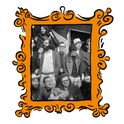Stepping Stones: Interviews with Seamus Heaneyby Dennis O'Driscoll (Faber and Faber, £22.50)
When the 20-year-old James Joyce first met WB Yeats, it is said that he told the older poet: "you are too old to help me." Seamus Heaney's first meeting with the poet Patrick Kavanagh makes a telling contrast. They encountered each other in a Dublin pub as Kavanagh—35 years Heaney's senior, and an established eminence of Irish poetry—was on his way back from the gents' toilets. Heaney, aged 28 and already something of a success, asked: "Mr Kavanagh, can I buy you a drink?" Kavanagh at first said "no." But when a friend told him who the person offering to buy the drink was, he changed his mind: "Kavanagh says to me, 'Are you Heaney?' rhyming me with Rainey, as people did in the country at home. 'Well, I'll have a Scotch.' So I took that as a pass." The two poets then talked for a short while; they would meet again just once.
The anecdote illustrates both Heaney's geniality and his humility, traits that appear consistently through Stepping Stones (and that differentiate him sharply from both the abrasive Joyce and from Kavanagh himself, a notably touchy poet). These interviews took place over five years, and the result is both an illuminating record of Heaney's poetic development and a store of some lesser known facts about his life. Readers expecting it to document a spontaneous dialogue may be disappointed, however: O'Driscoll (likewise a poet, and Heaney's long-term friend) notes in the preface that, at Heaney's request, "the interviews were conducted principally in writing and by post." The result is carefully measured, but never stilted. As a young man, we learn, Heaney took pride in his skill at herding cattle. He spent time as an MC for Irish dancers (that's fear a' tí in Irish, or "man of the house"), occasions on which, he observes, no priest was on duty because "it was a time when everybody was provided with their own inner priest." At different points Heaney worked as a waiter, and at the British Passport Office in London. His first piece of work published in a national paper was not a poem, but an article arguing that jive should be incorporated into Irish dancing.
The Heaney who emerges from this book is a lively figure. His friends are musicians and artists as well as writers, and he describes singsongs and arguments that continued through the night. Poets, in particular, seem to be an unruly bunch, constantly competing and sniping at one another. In addition to Kavanagh, he spent a lot of time with Michael Longley and Derek Mahon—a young Ulster editor cattily called them the "Tight Assed Trio." One of the less obvious gifts of Stepping Stones is the literary and cultural history that it contains, especially its portrayal of the artistic milieux of late twentieth century Belfast and Dublin.
Wisely, Heaney declines to explain his poems: they must speak for themselves or not at all. Instead, he provides an immensely rich autobiographical account of his childhood in Mossbawn, County Derry, his school and college years, his marriage, and his later life. Some of this material has surfaced before in Heaney's own essays, but O'Driscoll's questions allow for a sustained exploration of specific themes. The poet turns out to be a fine teller of his own story. But it is clear that Heaney is hyper-aware of his public persona and the industry that has developed around him. Introducing the book's first question, O'Driscoll observes: "You've said that, having so often read that you were born on a farm in Country Derry in 1939, you scarcely believe it any more." The tension between a poet's public and private life runs through Stepping Stones. When deciding on his lecture series at Oxford, Heaney reports, he first thought of writing a post-colonial account of a farm boy's journey from Derry to Oxford, "the interesting case of Heaney and hegemony, as it were. But very soon that approach struck me as entirely expected, too pat for a Paddy."
There's wryness here—a near-flippancy when Heaney talks about the world's perceptions of him. On occasion, though, he reaches into the earthy imagery familiar from his poems. When translating Beowulf, Heaney says, "I was like an oarsman on the rowing benches, getting on with the job. I hadn't to think of navigation, hadn't to calculate or keep an eye on the stars." Elsewhere he is a "man sentenced to hard labour, rolling up his sleeves," or in a more politically-edged description of his writing, a "servant boy" who "controls his anger." Other passages look back on the poet's discovery of his writerly self. When Heaney was composing an essay for school on "A Day at the Seaside," he recalls, "I made a connection between the performative student in me and a more inward creature, the writer-in-waiting."
Heaney's ironic use of the epithet "Paddy" reflects his awareness of the complications facing an Irish poet writing in English, with a British publisher. But his position as a Catholic in Northern Ireland made him a perennial outsider even in his own country, "not quite in place north or south." When his poems were printed in a Queen's University student magazine called Gorgon, the editors attributed them to one Sheamus Heaney. This, he says, is "a nice example of the reminders of their not-quiteness that people from a nationalist background were issued with in those days, entirely unconsciously and entirely effectively." Equally, though, the Irish Times got Heaney's name wrong when it first published one of his poems, crediting the work to a James Heaney—the Anglicized version of his name.
When Faber published Heaney's first book, Ian Hamilton, in The Review, suggested that "mud-caked fingers" had arrived in Russell Square. With his Nobel prize, Harvard and Oxford professorships and numerous other honours Heaney has surely proven him wrong. It's nice to know, however, that Heaney was never "discommoded by English critics gabbling on about the out-of-dateness of bulls and bogs."
When the 20-year-old James Joyce first met WB Yeats, it is said that he told the older poet: "you are too old to help me." Seamus Heaney's first meeting with the poet Patrick Kavanagh makes a telling contrast. They encountered each other in a Dublin pub as Kavanagh—35 years Heaney's senior, and an established eminence of Irish poetry—was on his way back from the gents' toilets. Heaney, aged 28 and already something of a success, asked: "Mr Kavanagh, can I buy you a drink?" Kavanagh at first said "no." But when a friend told him who the person offering to buy the drink was, he changed his mind: "Kavanagh says to me, 'Are you Heaney?' rhyming me with Rainey, as people did in the country at home. 'Well, I'll have a Scotch.' So I took that as a pass." The two poets then talked for a short while; they would meet again just once.
The anecdote illustrates both Heaney's geniality and his humility, traits that appear consistently through Stepping Stones (and that differentiate him sharply from both the abrasive Joyce and from Kavanagh himself, a notably touchy poet). These interviews took place over five years, and the result is both an illuminating record of Heaney's poetic development and a store of some lesser known facts about his life. Readers expecting it to document a spontaneous dialogue may be disappointed, however: O'Driscoll (likewise a poet, and Heaney's long-term friend) notes in the preface that, at Heaney's request, "the interviews were conducted principally in writing and by post." The result is carefully measured, but never stilted. As a young man, we learn, Heaney took pride in his skill at herding cattle. He spent time as an MC for Irish dancers (that's fear a' tí in Irish, or "man of the house"), occasions on which, he observes, no priest was on duty because "it was a time when everybody was provided with their own inner priest." At different points Heaney worked as a waiter, and at the British Passport Office in London. His first piece of work published in a national paper was not a poem, but an article arguing that jive should be incorporated into Irish dancing.
The Heaney who emerges from this book is a lively figure. His friends are musicians and artists as well as writers, and he describes singsongs and arguments that continued through the night. Poets, in particular, seem to be an unruly bunch, constantly competing and sniping at one another. In addition to Kavanagh, he spent a lot of time with Michael Longley and Derek Mahon—a young Ulster editor cattily called them the "Tight Assed Trio." One of the less obvious gifts of Stepping Stones is the literary and cultural history that it contains, especially its portrayal of the artistic milieux of late twentieth century Belfast and Dublin.
Wisely, Heaney declines to explain his poems: they must speak for themselves or not at all. Instead, he provides an immensely rich autobiographical account of his childhood in Mossbawn, County Derry, his school and college years, his marriage, and his later life. Some of this material has surfaced before in Heaney's own essays, but O'Driscoll's questions allow for a sustained exploration of specific themes. The poet turns out to be a fine teller of his own story. But it is clear that Heaney is hyper-aware of his public persona and the industry that has developed around him. Introducing the book's first question, O'Driscoll observes: "You've said that, having so often read that you were born on a farm in Country Derry in 1939, you scarcely believe it any more." The tension between a poet's public and private life runs through Stepping Stones. When deciding on his lecture series at Oxford, Heaney reports, he first thought of writing a post-colonial account of a farm boy's journey from Derry to Oxford, "the interesting case of Heaney and hegemony, as it were. But very soon that approach struck me as entirely expected, too pat for a Paddy."
There's wryness here—a near-flippancy when Heaney talks about the world's perceptions of him. On occasion, though, he reaches into the earthy imagery familiar from his poems. When translating Beowulf, Heaney says, "I was like an oarsman on the rowing benches, getting on with the job. I hadn't to think of navigation, hadn't to calculate or keep an eye on the stars." Elsewhere he is a "man sentenced to hard labour, rolling up his sleeves," or in a more politically-edged description of his writing, a "servant boy" who "controls his anger." Other passages look back on the poet's discovery of his writerly self. When Heaney was composing an essay for school on "A Day at the Seaside," he recalls, "I made a connection between the performative student in me and a more inward creature, the writer-in-waiting."
Heaney's ironic use of the epithet "Paddy" reflects his awareness of the complications facing an Irish poet writing in English, with a British publisher. But his position as a Catholic in Northern Ireland made him a perennial outsider even in his own country, "not quite in place north or south." When his poems were printed in a Queen's University student magazine called Gorgon, the editors attributed them to one Sheamus Heaney. This, he says, is "a nice example of the reminders of their not-quiteness that people from a nationalist background were issued with in those days, entirely unconsciously and entirely effectively." Equally, though, the Irish Times got Heaney's name wrong when it first published one of his poems, crediting the work to a James Heaney—the Anglicized version of his name.
When Faber published Heaney's first book, Ian Hamilton, in The Review, suggested that "mud-caked fingers" had arrived in Russell Square. With his Nobel prize, Harvard and Oxford professorships and numerous other honours Heaney has surely proven him wrong. It's nice to know, however, that Heaney was never "discommoded by English critics gabbling on about the out-of-dateness of bulls and bogs."











